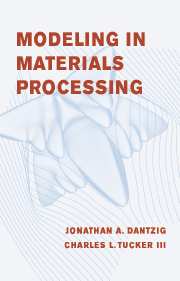Book contents
- Frontmatter
- Contents
- Preface
- Principal Nomenclature
- 1 Introduction
- 2 Governing Equations
- 3 Scaling and Model Simplification
- 4 Heat Conduction and Materials Processing
- 5 Isothermal Newtonian Fluid Flow
- 6 Non-Newtonian Fluid Flow
- 7 Heat Transfer with Fluid Flow
- 8 Mass Transfer and Solidification Microstructures
- A Mathematical Background
- B Balance and Kinematic Equations
- Bibliography
- Index
8 - Mass Transfer and Solidification Microstructures
Published online by Cambridge University Press: 05 June 2012
- Frontmatter
- Contents
- Preface
- Principal Nomenclature
- 1 Introduction
- 2 Governing Equations
- 3 Scaling and Model Simplification
- 4 Heat Conduction and Materials Processing
- 5 Isothermal Newtonian Fluid Flow
- 6 Non-Newtonian Fluid Flow
- 7 Heat Transfer with Fluid Flow
- 8 Mass Transfer and Solidification Microstructures
- A Mathematical Background
- B Balance and Kinematic Equations
- Bibliography
- Index
Summary
In previous chapters we considered homogeneous materials, but there are many significant problems in materials processing in which more than one chemical species is involved. One technologically important case is the solidification of metal alloys. When more than one species is present, we must address two additional considerations: chemical equilibrium between the various phases, and transport of the species by diffusion. This chapter begins by setting up the governing equations for diffusion and shows that species transport is mathematically similar to energy transport. The use of the diffusion equations is demonstrated in several example applications. We then look at solute partitioning in alloy solidification, consider the stability of the solid–liquid interface in solidification, and show how these phenomena control microstructure development.
GOVERNING EQUATIONS FOR DIFFUSION
When two soluble materials are put into contact, they mix through the action of molecular diffusion. If one waits long enough, a final state is achieved in which the local concentration of each species is uniform. As an example, think about pouring milk into hot coffee. Eventually, the coffee reaches a uniform light color, which we associate with complete mixing. We can make “eventually” arrive sooner by stirring the coffee, which transports material by advection, but diffusion operates whether we stir or not.
Our discussion of diffusion will be confined to systems in which the species are completely miscible for any composition that is present in the problem.
Information
- Type
- Chapter
- Information
- Modeling in Materials Processing , pp. 282 - 326Publisher: Cambridge University PressPrint publication year: 2001
